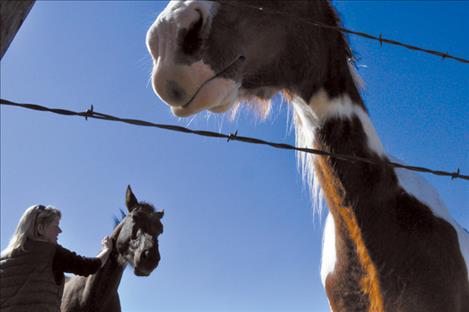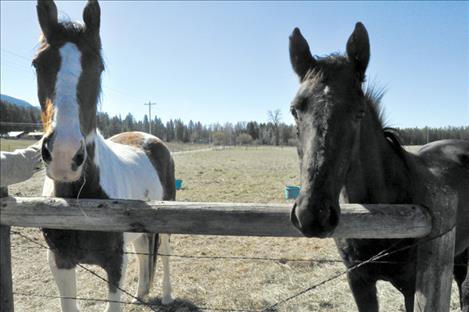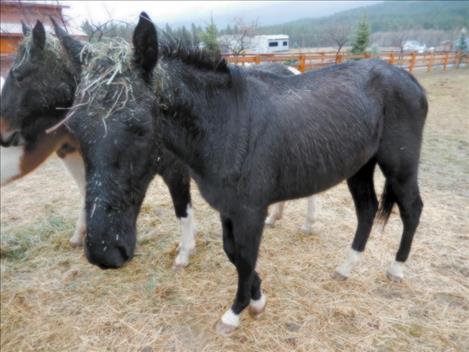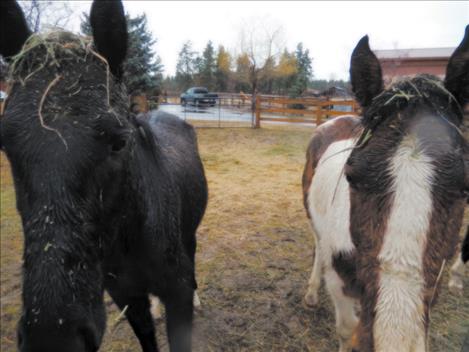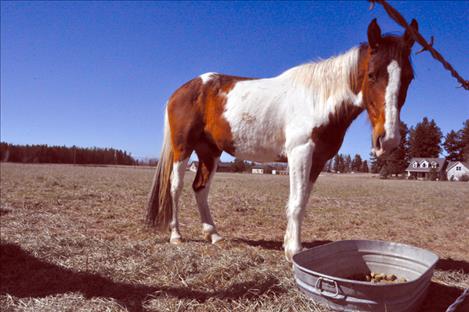Woman rescues horses, hopes others will promote large-animal well-being
Hey savvy news reader! Thanks for choosing local.
You are now reading
3 of 3 free articles.
LAKE COUNTY – Three horses are safe, sound and on the road to recovery after a kind-hearted Ronan woman rescued them from a neglectful owner, but those involved in saving the animals worry there are others out there suffering because of a lack of large-animal rescue resources in the area.
Shannon Dougherty Luikart received a call from Mission Valley Animal Shelter in March about three horses that appeared to be starving in St. Ignatius. Shelter Director Jill Simpson was hoping Dougherty Luikart might know of a horse rescue that could help. With no rescue resources available, Dougherty Luikart took matters into her own hands.
She drove to St. Ignatius where she found the animals in a desperate condition. They had no food or water, were tied to farm equipment with no vegetation in sight, and were severely emaciated. The owner said he only watered the horses once per day.
“They were eating the trees,” Dougherty Luikart said. “It was horrific. These horses were in survival mode.”
Dougherty Luikart was able to buy a single mare upon her first visit to the owner for $100, but two male horses had to be left behind.
Dougherty Luikart called a veterinarian who wrote a report for the Lake County Sheriff’s Office saying that on a scale of 1 to 10, with 1 being a skeleton and a 10 being obese, the horses were a 2. The Lake County Sheriff’s Office took that report and cited the owner for three counts of animal cruelty. Luikart was able to rescue the other two horses.
It was a bit demanding for Luikart to take the horses in because she already has three plump, loveable babies of her own. As of May the horses were steadily putting on weight, though they were still shy and skittish about being handled by people.
Eventually Luikart would like to find foster families for the animals, but in the meantime she hopes people can come together to help promote horse welfare across the valley.
“They are living beings, they are not just property,” Luikart said.
Raymond Yoder, 49, was cited for three counts of misdemeanor animal abuse, cruelty and neglect in the case. He has not been sentenced.
Luikart fears there are other owners like Yoder out there and Simpson said she’s right. The animal shelter has calls almost weekly about horses not getting enough food, especially in the winter.
“My hands are tied to a certain extent,” Simpson said. “I can only guide these people. We have very limited resources and horses use a lot of resources.”
The shelter does not take horses and there are few facilities in Montana that do. Simpson said people can help curb horse suffering in Lake County by making sure they understand exactly what they are getting into when they decide to own the animals. The reasons Simpson hears for not providing adequate care vary: some fall on hard times, others realize too late that they don’t have all the resources to raise an animal, and others just don’t understand what horses need.
“You have to think about what this is going to cost,” Simpson said. “Can you afford food and veterinary care?”
States like Kentucky and California have designated space, healthcare, food, and water requirements that horse owners must meet or risk forfeiting their animals. The guidelines for animal care issued by the State of Kentucky say horses need to eat hay or grass each day that equals one to two percent of their bodyweight. That means a 1,000-pound horse should eat between 10 and 15 pounds of hay per day. The guidelines require that the hay be clean and free of mold. It is also suggested that the animals be offered water at least twice per day. The animals need between five and 12 gallons of water each day, though mothers with nursing foals might require up to 70 percent more water.
The animals also require shelter in Kentucky, and the state says they should be exercised daily if kept in a stable. If the animal has a disease, Kentucky law says the owner must put the horse under veterinary care.
A conviction for first time offenders is a misdemeanor; subsequent offenses become felonies, and offenders can face a $10,000 fine and up to five years in prison.
But in Montana, the laws aren’t as strict, nor are they as well defined.
“They see them as livestock,” Luikart said.
Montana’s state law says that people must provide food and water sufficient to sustain the animal’s normal health. Those who are convicted of animal cruelty can be fined up to $1,000 and sentenced to a year in jail for a first offense. Subsequent offenses can result in up to $2,500 in fines and a two-year sentence to the Department of Corrections.
Simpson said she hopes people can come together and get some of the laws changed.
“Somewhere like rural Montana, everyone thinks it is their right to own a horse,” Simpson said. “Well it is, if you can afford to take care of it … but if law enforcement is called in there is not much they can do. They can cite somebody for cruelty or neglect, but a lot of time that’s hard to prove. And a lot of time there’s not much follow-through. It seems like people go to court and get their knuckles rapped and then they do it again. There aren’t a lot of laws protecting the animals.”
Montana State Senator Eric Moore, a Miles City Republican, sponsored a bill in the 2015 legislative session that would have made state animal abuse law more stringent by requiring people who know about abuse to turn it into law enforcement within 24 hours. The bill also would have clarified that people seizing animals that are abused have to be under direction of the county sheriff’s office.
“I am an animal lover,” Moore told the Senator Agriculture, Livestock and Irrigation Committee in February when the bill was brought up for consideration. “But more than that, I make my living with animals. If they don’t perform, I don’t feed my kids. Animal abuse, I don’t just feel is morally wrong, but is also professionally insulting.”
The Farm Bureau and Montana Stockgrowers Association, and Montana Veterinary Association testified in support of the bill, partly because it would have helped cut back on animal rights groups secretly recording abuse and holding video footage for months before releasing it to the public for fundraising purposes, instead of reporting it immediately to authorities who might be able to remedy the situation.
“That will assure it will get stopped,” Farm Bureau representative Nicole Rolf said. “If they have evidence of abuse, we want it to be used to stop the abuse.”
Nannette Gilbertson of the American Society for the Prevention of Cruelty to Animals was the sole opponent of the bill, who said that requiring a person to report abuse within 24 hours would hinder investigations.
“There’s not another place in statute that requires a witness to a crime to report it within 24 hours,” Gilbertson said.
The bill died in committee and never reached a vote. As legislative action has been scant, Luikart and Simpson agree it’s up to individuals to make a difference. Luikart said she’s been overwhelmed by how helpful members of the community and local businesses have been at getting her three rescues back on their feet once she took the initial steps to report the abuse.
“If you see something, report it,” Luikart said.















